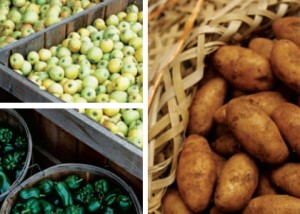 At the College of Naturopathic Medicine, all students are given an in depth knowledge of how to use food as medicine and medicine as food. In training the question always arises whether naturopaths and nutritional therapists should encourage all their patients to eat organically. Does organic food confer better health benefits than non-organic? If so, in what way is it better?
At the College of Naturopathic Medicine, all students are given an in depth knowledge of how to use food as medicine and medicine as food. In training the question always arises whether naturopaths and nutritional therapists should encourage all their patients to eat organically. Does organic food confer better health benefits than non-organic? If so, in what way is it better?
There are 3 main issues, nutrient levels, pesticide residues and ethical and environmental issues.
NUTRIENT LEVELS
In general the research is very confusing with some very well designed studies showing higher vitamin and mineral levels in organic food and other studies showing no difference. However in a recent £12m four-year project it was found that organic fruit and vegetables contained as much as 40% more antioxidants, which scientists believe can cut the risk of cancer and heart disease, the biggest killers in the western world. The organic produce also had higher levels of beneficial minerals such as iron and zinc. Professor Carlo Leifert, the co-ordinator of the European Union-funded project, said the differences were so marked that organic produce would help to increase the nutrient intake of people not eating the recommended five portions a day of fruit and vegetables. This study bodes well in influencing government policies to support organic growing but more research needs to be done to show conclusive results.
PESTICIDE RESIDUES
Consuming more organic food may be the way to improve one’s nutrient intake, but it also may be the safest. Non-organic food proponents in the food industry suggest that pesticide residues in foods are known to be safe on the basis of total diet surveys that supposedly find the levels of pesticide residue in our food to be very low and within acceptable safely limits. However the latest annual report on pesticide residues in the UK showed that about half the fresh fruit and vegetable samples tested contained pesticide residues. The long-term effects of pesticide residues and the implications of different mixes of chemicals on human health have not been established. Also, a number of studies show that when nitrates, a common element of artificial fertilisers, are converted to nitrosamines they may be carcinogenic. In terms of risk reduction from foods we recommend as a training provider that it is always best to eat food produced as naturally as possible, harvested locally and eaten in the minimum time possible since being picked. Our farmer’s markets provide this service very well. There is so much to be learnt in terms of the life-force of foods and how it effects us but we all know the sweetness of eating fruit freshly picked from the tree and unsprayed lettuce straight from the vegetable patch. Most of us would agree it tastes significantly better.
ETHICAL ISSUES AND ENVIRONMENT
Conventional farming and agricultural practices are quite damaging for soil and the environment. Tons and tons of pesticides and fertilisers are being washed down into rivers; the soil is being eroded by the intensive and aggressive farming methods that we often use. These chemicals are then being reabsorbed through the food and back into our systems. Earth pollution and animal welfare are important and sensitive issues and those with awareness of how we are treating the planet and our animals are choosing to eat organic produce, which is grown with consideration towards both.
The biggest challenge facing all of us is to support and encourage each other to eat food high in life force, high in nutrient density and as unprocessed as possible. Though the arguments are not conclusive eating organically seems to support this.
References
1 Food Standards Agency, Position Paper: Food Standards Agency View on Organic Foods, 23 August 2000
[http://www.foodstandards.gov.uk/pdf_files/organicview.pdf].
2 Ministry of Agriculture, Fisheries and Food, Annual Report Of The Working Party On Pesticide Residues, 1999, MAFF
Publications, 2000.
3 K Clancy, The role of sustainable agriculture in improving the safety and quality of the food supply, American Journal
of Alternative Agriculture, 1, 1986, and see also Joint Food Safety and Standards Group Nitrate in Lettuce and Spinach,
Food Surveillance Information Sheet no 177, MAFF and Department of health, May 1999.

![organic-food-300×214[1]](https://www.positivelife.ie/dev/wp-content/uploads/2008/12/organic-food-300x2141.jpg)
